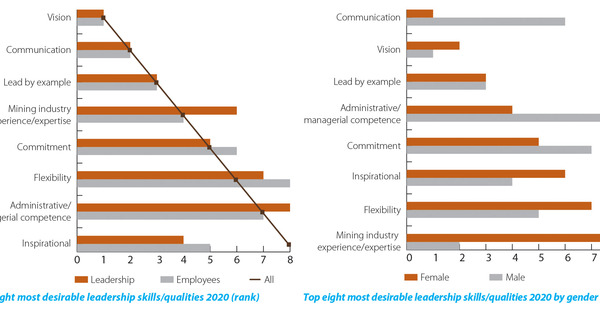Now, in our third year of the survey and the Global Leadership Report (GLR) - to which the survey is geared - we can draw some meaningful year-on-year comparisons and identify trends in what leadership and employee groupings consider the most desirable skills and traits in industry leaders at the forefront of a a sector undergoing an arguably unprecedented period of change.
We shall start at the top. Since the inaugural survey in 2018, the top three positions have been dominated by ‘vision', ‘communication', and ‘lead by example' - but not always in that order.
‘Vision' claimed the number spot most frequently, while ‘lead by example' consistently held third place. However, Lorraine Meldrum, chief executive of international executive search and advisory firm Swann, stressed the importance of ‘lead by example', especially from an employee perspective.
"People can hear the words, and they can read the words, but they need to actually see the commitment from the leadership," she said.
"A leadership team is judged by its employees - or future employees - as representative of the type of company they might want to work with; a company that's a desirable employer."
George Hemingway, partner and innovation practice leader at global consultancy, Stratalis Group, suggested it was unsurprising ‘vision', ‘communication' and ‘lead by example' dominated the top three, particularly during uncertain times such as the COVID-19 pandemic.
"We still expect our leaders to get on a horse, raise their sword and charge with us into the great unknown," he said.
Perhaps the single anomaly vis-à-vis the top three positions over the course of the past few years was the importance placed on ‘mining industry experience and expertise', which cropped up in third place for leadership respondents back in 2018. It has not replicated its success since, though it has remained on the tail of the prime spots.
"In a dynamic world, where trust and relationships matter as much as operations, skills and competencies, other than mining industry experience and expertise, are considered critically important," Hemingway said. "It's why people like [former chief executive] Fabio Schvartsman was chosen to head up majors like Vale, and it continues today with the broad experience you see in the executive team and with the new CEO, Eduardo Bartolomeo"
Hemingway also said that a closer look at the gender-based breakdown of Mining Journal Intelligence's Leadership Leaderboard analysis could help explain the mediocre positioning of ‘mining experience and expertise'. Indeed, it revealed this was the least sought-after skillset amongst female respondents.
One might argue, Hemingway said, this particular finding reflected the modern-day reality where women with mining operations experience fill fewer executive positions in the resources industry than their male counterparts.
However, there is of course a more widespread issue in that women still only account for a small percentage of the mining sector workforce overall. Such findings serve as a spotlight on the need for the industry to work harder to attract women to mining-based roles and encouraging development of mining industry experience and expertise.
Meldrum, on the other hand, was adamant ‘mining industry experience and expertise' were crucial in recruitment for senior positions at mining companies around the world - amongst men and women alike.
"Companies will still look for people with experience in mining because its different," she said. "West Africa's different; Canada's different - these are locations where each offer something different. But you need some experience of it to get you to the top of the mining company.
"While people need to have the experience, it is a bit ‘chicken and egg'. How do I get the experience if nobody will give me a job in the industry?"
More generally, Meldrum said recruiting people with other skills sets to the mining space remained difficult, however the COVID-19 pandemic perhaps presented an opportunity to take to change the "language about mining, so people see that it is a good industry to be in".
"Mining has continued because everything we wear; eat; the car we drive; laptops etc, comes from mining," she said. "This pandemic presents a good opportunity to help people realise mining is a good thing and try and get more people into geology, engineering processing etc."
‘Flexibility' traditionally holds a position in the bottom three of the Leadership Leaderboard along with ‘inspirational' and ‘administrative/managerial competence'. We expected ‘flexibility' to have crept up the list in light of the COVID-19 pandemic¸ which upended the traditional office-based work environment and paved the way for the already increasingly popularity of the flexible working model.
Meldrum said ‘flexibility' was important for people in different ways.
"It depends on a person's situation and desires: if you live alone, in a tiny flat, in the middle of London, who wants to be working from home? You would much rather be in an office. Or, do you have access to a park down the road; do you have a back garden? Have you got a pet, have you got kids?
"Flexibility means different things to different people. So, perhaps that's the reason we're seeing it at the bottom of the list, nevertheless with the pandemic it's amazing it hasn't crept up the list a little bit more."

Read the Mining Journal Intelligence Global Leadership Report here


























